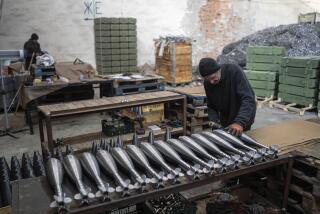Subsidize or Privatize: Bitter Battle Rages Over Fate of Russian Factory : Economy: Free-market supporters want government to stop propping up Rybinsk Motors; opponents say human costs are too high.
- Share via
RYBINSK, Russia — Most of the machinery in the vast production hall at Rybinsk Motors stands eerily silent, and the few visible employees are tucked in corners reading recipe books or playing dominoes.
*
For months, the plant has been working at 25% capacity. The few aircraft engines it is producing do not meet most current safety standards.
Despite the quiet, a battle is raging over the fate of Russia’s largest aircraft engine producer. The issue: whether to subsidize or privatize.
Supporters of a rapid changeover to free markets want the government to stop propping up Rybinsk and other old state industries. Their opponents say the human costs of privatization are too high.
It is a struggle familiar in many factory towns across Russia, as managers spar with the national government to stay alive despite low demand for their goods and dwindling funds.
Aggravating all these fights is the mounting discord between Moscow and its disenchanted regions.
The battle has intensified ahead of December’s parliamentary elections, in which communists and other opponents of market reforms are expected to do well.
At stake at Rybinsk Motors are Russia’s military and civilian aircraft engine industry, thousands of jobs, and a city of 100,000 people relying on the factory to pay for its schools, hospitals and other social services.
Valery Shelgunov, director of Rybinsk Motors, says the factory is floundering because of poor management by its previous director. He says the factory just made a small profit and he wants continued subsidies to keep the 24,500 employees working and to modernize.
The government says the factory is bankrupt and wants to sell off its 37% stake as soon as possible. The rest of the stock is owned by the workers, the city administration and some private investors.
Shelgunov says the government is using Rybinsk Motors as a pawn in a political game and has no interest in saving Russian industry.
The government says it is trying to crack down on inefficient Soviet-era production practices and promote a free market.
Even the troubled former state airline, Aeroflot, has begun turning to foreign-made engines. Russia’s cash-strapped military, which once relied on Rybinsk’s engines, has not placed an order in months.
“We were raised under the socialist system. It’s not our fault,” Shelgunov said, sitting in his office surrounded by model airplanes and charts showing declining production and increasing prices.
He estimated more than 90% of Russian enterprises are in similar straits. “They’re probably all on their knees.”
On this point, his rivals at the Federal Bankruptcy Administration agree--and say this is where the problem lies.
Pyotr Mostovoi, the agency’s head, says Russia’s transition to a market economy is being hurt by managers unable to adjust from the previous system in which central planners made all economic decisions. Those factories are operating at partial capacity and producing goods for which there is little or no demand, he says.
Others say Russia is falling apart because of market reforms.
“Without us, the whole city would collapse,” said Albert Dushin, foreman of the factory’s main assembly plant.
Rybinsk Motors supports 60% of the economy of Rybinsk, 200 miles northeast of Moscow.
The workers, not surprisingly, just want to keep working.
“Personally, I don’t care if [the factory] is state-run or private. I just want to feed my kids,” said Leonid Alexeyev, a 42-year-old machinist.
He has not received his monthly 200,000-ruble ($45) salary in months.
The factory’s directors argue the state should give 50 trillion rubles ($11.2 billion) to save the plant. They point to the pretax profit of 126.9 billion rubles ($27 million) the factory made in the first eight months of the year--its first since the collapse of the Soviet Union.
The Defense Ministry supports Shelgunov, desperate to preserve yet another dying defense enterprise--but it has no money to help.
The battle also reflects a growing tension between Moscow and Russia’s regions, which have been hit hardest by the country’s economic problems and where skepticism about free markets runs high.
“Moscow only makes decisions that benefit itself,” said Lidia Sidirova, an inspector at the factory.
“As long as they have good sausages in the stores, everything is OK,” she said. “And what do we have out here? They don’t care.”
More to Read
Sign up for Essential California
The most important California stories and recommendations in your inbox every morning.
You may occasionally receive promotional content from the Los Angeles Times.













